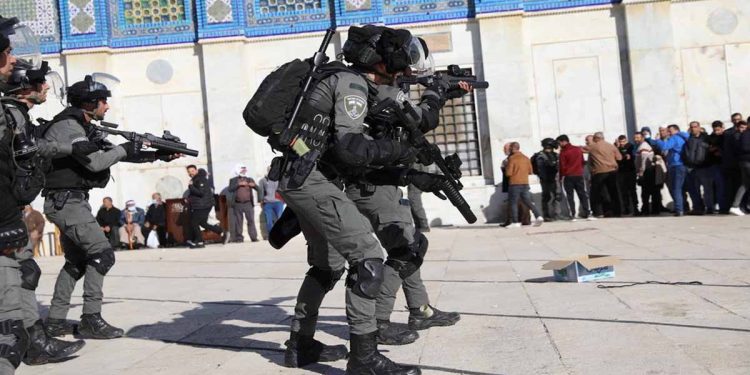The Israeli occupation authorities continue to impose a comprehensive siege on occupied Jerusalem—particularly on the Old City—for the sixth consecutive day. This includes the closure of Al-Aqsa Mosque and the Church of the Holy Sepulchre, disruption of daily life through repeated raids, arrest campaigns, and the installation of new checkpoints, in a systematic escalation targeting the social, religious, and demographic fabric of the city.
This escalation is part of an integrated policy of repression and collective punishment aimed at asserting greater security and demographic control while undermining any prospects for a free or sovereign Palestinian presence in Jerusalem.
The closure of Al-Aqsa Mosque and the Church of the Holy Sepulchre—two of the most significant religious and cultural landmarks for Palestinian Muslims and Christians—represents a blatant violation of the right to freedom of worship. It exposes the occupation’s attempt to impose new facts on the ground by limiting access to holy sites and militarizing the city.
This unprecedented closure continues into its sixth day, alongside heavy deployment of Israeli forces at the gates of the Old City, preventing worshippers from entering and imposing severe restrictions on movement, including assaults on passersby and the confiscation of ID cards.
In the latest extrajudicial killing, 21-year-old Moataz Hamza Hussein Al-Hajjajla from the village of Al-Walaja, southwest of Jerusalem, was beaten and shot in the chest by Israeli forces at dawn today. He was then dragged away while wounded to an unknown location. The number of Jerusalemite Palestinians whose bodies remain withheld by Israel has now risen to 47.
The Israeli policy of holding bodies violates the most basic principles of human dignity and constitutes a systematic form of collective punishment. Families are denied the right to bury and mourn their loved ones, while the deceased are used as political and security leverage—an act fundamentally opposed to international humanitarian law.
By contrast, the body of Mohammad Hassan Hasni Abu Hammad (41) from Al-Eizariya was handed over last night after being held since his killing on March 25. His funeral was marked by widespread anger and condemnation of Israel’s practices.
Meanwhile, Israeli forces continued nightly raids in multiple neighborhoods, particularly in Silwan, Issawiya, At-Tur, and Shuafat refugee camp. They assaulted residents, stormed homes, and arrested Maher Ayyad Rabee from the town of Beit Anan after raiding his home at dawn.
In the town of Abu Dis east of the city, multiple residents suffered suffocation and bruises due to a violent raid involving physical assaults and heavy use of tear gas and stun grenades.
Simultaneously, the Jaba checkpoint northeast of Jerusalem has experienced closures since yesterday afternoon until this morning due to the installation of metal gates and new surveillance rooms. This is part of the occupation’s efforts to expand its network of separation and siege. These measures have severely disrupted daily movement, causing traffic jams and hardship for students, patients, and workers, especially amid high temperatures.
What is happening in Jerusalem cannot be separated from a broader context of repressive policies aimed at Judaizing the city and isolating it from its Palestinian surroundings. Today, over 85 checkpoints and roadblocks are in place, forming a comprehensive system of control and discrimination designed to restrict movement and exhaust Jerusalemites both psychologically and economically.
The policies of nightly raids, field executions, body withholding, closure of places of worship, and control over city entrances all reflect a colonial reality that violates international norms which protect holy sites and prohibit targeting civilians.
In the absence of any international accountability, the occupation continues to entrench a reality that leaves Jerusalemites with no choice but to resist daily repression. Meanwhile, international silence only emboldens the occupying power and deepens the humanitarian and political crisis in a city whose identity is under siege, day after day.


























